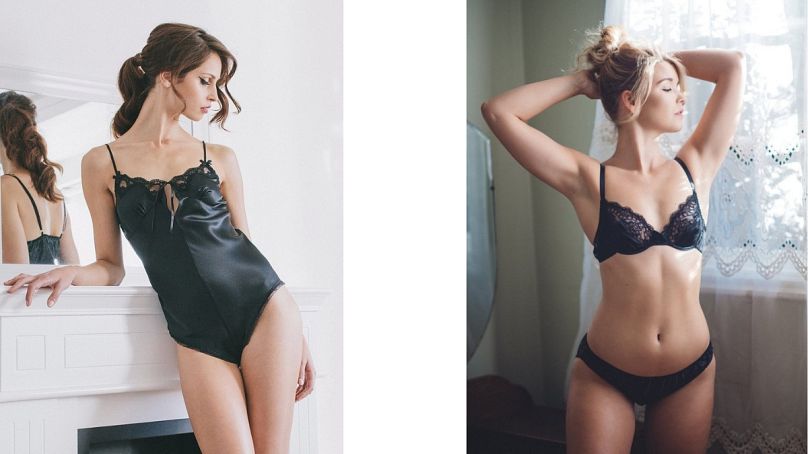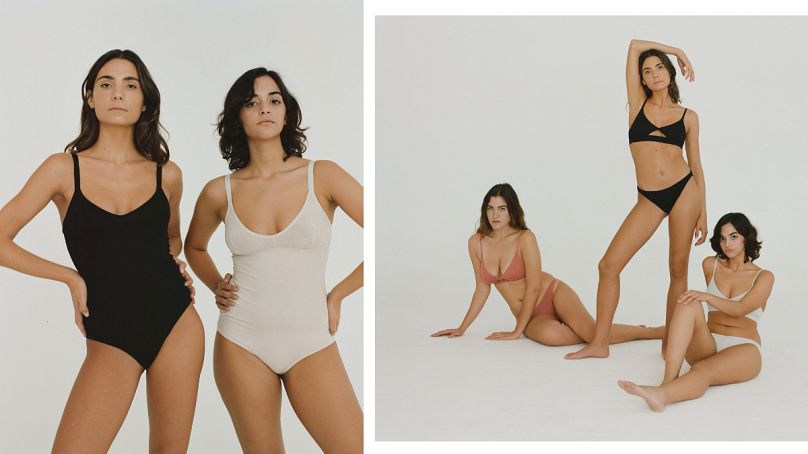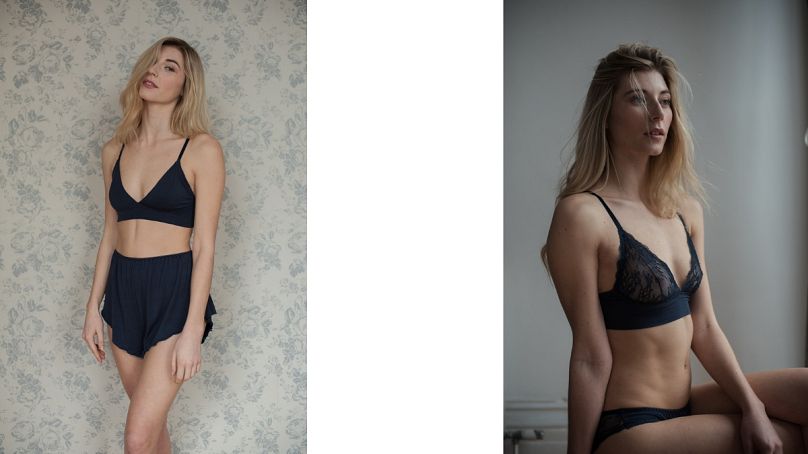These four ethical lingerie brands are on a mission to prove that sustainability is sexy.
As the Environmental Audit Committee (EAC) released this week the name of the least sustainable brands in the UK, we’re not surprised to see fast fashion brands such as Missguided and Boohoo, both of which mainly offering cheap and sexy party wear, top the list.
 ADVERTISEMENT
ADVERTISEMENT
 ADVERTISEMENT
ADVERTISEMENT
Good news: there are many other brands offering garments just as sexy and trendy, minus the environmental and human cost. Let’s take a look at underwear - one of the most thrown away pieces of clothing. With these you won’t have to choose between sophistication, comfort or sustainability because these four brands have it all. Showtime.
Ayten Gasson
Brighton-based lingerie boutique Ayten Gasson produces high quality luxury pieces, available in store and online. Designer Ayten Roberts is gaining popularity in the UK for her use of upcycled vintage Nottingham lace: “I like using vintage English laces because it highlights the wonderful skill that Nottingham was once famed for. The detail and feel of these laces are exquisite and sit beautifully with the silk,” Roberts describes.
Beyond her strong commitment to supporting the UK manufacturing industry (she works with many local factories from lace mills to printers) the designer is also working hard to limit her environmental impact. “Our lingerie have minimal carbon footprint. Online orders are sent out to customers in an ethically sourced packaging, which is biodegradable and recyclable. We use UK suppliers as much as possible and natural fibres such as silk and cotton, which reduces plastic pollution,” Roberts adds.
In fact, most of her pices are made of 100% silk, 100% cotton tana lawn, and organic ethical bamboo and modal mix. The brand takes a strong stance against waste by using traditional sewing methods such as french seams and roll hems, instead of the types of seams used in mass production. This allows the lingerie items to last longer. “We also only make a couple of each style in each size, to limit wastage. We try to use reclaimed fabric, which is dead stock from larger factories and design houses so these beautiful materials do not end up in landfills,” Roberts explains.
The challenge ahead : making this type of fashion available to everyone. Sourcing ethical raw materials and trims often comes at a high price, which makes the end product more expensive.
Shop the brand **www.aytengasson.com
**
Nude Label
From cute bodies to colourful bras, new comer Nude Label has become successful in its four years of existence. Based in Valencia (Spain), it was founded by designers Ana Alemany and Clara Ropero.
“We created Nude Label because we realized there was a gap in the market when it comes to underwear. There weren't many options of basic and comfy, but also nice and well made, undies. We found they were either uncomfortable but sexy with lace and bows or unappealing but comfy and basic. That's when we decided to create simple, natural, underwear for women who want to feel confident and comfortable,” says Alemany.
When it comes to reducing their environmental and social impacts, both designers think the key word is ‘local’. Everything is produced in Valencia to support the local economy. “The factory is very close to our studio so we can ensure the quality of the garments and the working conditions are the right ones,” Alemany adds.
The underwears are made with organic cotton. The cotton, accessories (fasteners, sliders and rings) and elastics band have received the Oeko-tex 100 certificate. This is an independent product label, recognized internationally, that guarantees textiles of all sorts within the product have been tested and certified free from toxic compounds.
“I believe the most important thing to care about is where the garments are coming from. It is good to know not just the country of origin but also the factories they have been made in. It is important to know the people working behind the clothes and that's why all the brands should compromise on being more transparent and giving more information about our production and environmental practices,” Alemany concludes.
Shop the brand www.thenudelabel.com
Naja
US-based lingerie brand Naja has always had a strong focus on minimising its environmental impact. The brand’s main goal is to create lingerie items with minimal water usage. “We wanted to have a goal that we could focus on and ours is water and the oceans. So, we’re mainly using less water than a regular brand and making products from post consumer recycled plastic that could end up in our seas,” explains CEO Catalina Girald.
The brand prints items digitally instead of using rotary wet dyeing processes. This method allows them to keep an important amount of water as simply none of it is used in sublimation or digital printing. Naja’s fight against waste is also sensible in her choice of fabric. Although materials vary, the brand strives to make most things out of recycled PET or scrap fabrics from large productions that would have gone into landfills otherwise .
Educating consumers about these practices and promoting the idea of sustainability in the fashion industry is an important objective for those working at Naja. “The apparel industry as a whole has a long way to go in sustainability and in ensuring ethical practices. It's more expensive to make and consumers are always looking for a deal, so this attitude doesn't help further ethical and sustainable goals. As consumers we should really try to focus on owning less and being willing to pay more for things that are well made with good practices behind them,” Girald concludes.
Shop the brand: **www.naja.co
**
Luva Huva
UK-based brand Luva Huva is a niche ethical lingerie label that refuses mass production and wholesale of the products, and chooses to focus on a range of initiatives that promote local work and reduce environmental issues instead.
“We hand-craft all our clothes on a made to order basis and sent directly to the customer instead of ordering in bulk to factories. This way, we support the U.K manufactures of elastic, source dead stock and factory end of line laces and fabrics.
We make everything in house we are a small team of four women. We work on all aspects of production from design, pattern making and sewing to the final wrapping and packing of the finished garments,” explains Joanna Ketterer, founder of Luva Huva.
Environmentally friendly fabrics are also used to create different pieces, such as bamboo, organic cotton, soy and hemp grown without genetically modified seeds. Recycling is also a top priority, and the team donates any waste fabrics to local schools and colleges. “We also work with other ethical brands such as Critically Endangered Socks who donates 20% to help endangered animals,” Ketterer adds.
Although improvements needs to be done in the lingerie industry (and in the fashion industry as a whole) to make it more sustainable, there is still reasons to be optimistic as changes are gradually taking place. “If more companies change and the consumer's awareness changes it will make a big positive impact. When we started over 10 years ago there were very few brands using sustainable fabrics for lingerie and that has changed dramatically over the years which is a great thing,” Ketterer concludes.
Shop the brand: www.luvahuva.co.uk
Writer: Lea Surugue













